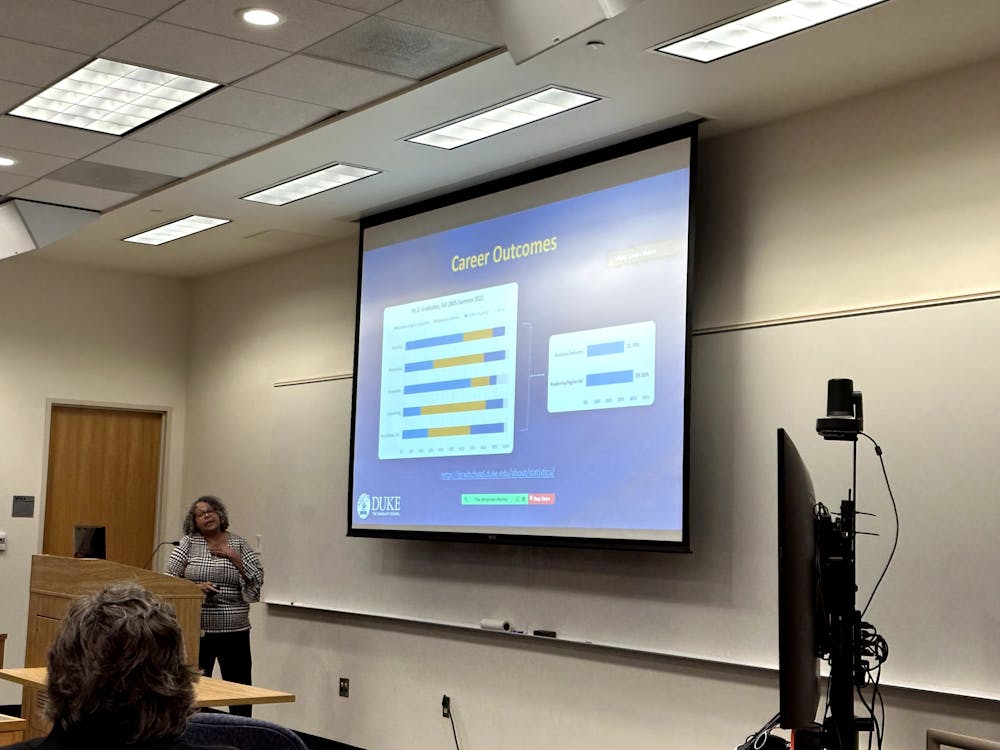Academic Council heard from Suzanne Barbour, dean of the Graduate School, and considered a proposal to change the required academic credentials for tenure-track faculty in Duke’s visual and performing arts departments in its Thursday meeting.
The Council also selected the two candidates for the upcoming election to decide its next chair.
Graduate education
Barbour began as the dean of the Graduate School in September after serving in a similar capacity at the University of North Carolina at Chapel Hill.
She presented to the Council her “30,000 foot view” of how she sees graduate education at Duke evolving, based on what she has learned in her four months at the University and the initiatives she’s helped implement at other universities.
Among Barbour’s goals is to increase the number of fellowships available for doctoral students and to grow professional development opportunities.
“I would argue that some of that anxiety and depression that we see in graduate students is not just related to maybe not progressing or not having strong financial support. I think some of it is career angst and just not knowing what they're going to do,” she said.
She also said that she wants to help improve faculty mentorship by providing them with training and “enhance the climate” among graduate students, mentioning the Duke Graduate Student Union’s unionization efforts.
“I imagine a lot of you are probably aware of the wave of student organizing and unionization that's happening across the country. In fact, we have a card signing campaign going on here right now,” Barbour said. “You can attribute some of that to financial support for students, but a lot of it actually has to do with the climate and the culture that students find themselves in. They want to be part of the system. They want to have a seat at the table. And so I think those are conversations we're going to have to have going forward as well.”
Barbour also presented figures on the enrollment trends and career outcomes for students at the Graduate School.
According to Barbour, the percentage of students enrolled in the Graduate School seeking doctoral degrees has been steadily decreasing, while the percentage of students seeking master’s degrees has gone up in recent years.
“The kind of student we have on campus is changing,” Barbour said. “It does suggest that we may need to rethink some of the things we do in the Graduate School, which tend to be very much Ph.D.-centric.”
Barbour also noted the increase in international master’s and doctoral students enrolled in the Graduate School, as well as an “uptick” in students who come from underrepresented groups. She said that further increasing diversity among the graduate student body starts with driving applications up among those in underrepresented groups.
“We're going to do it at the application level. We got to get more students interested in looking at this place,” she said.
One Council member asked about how diversity initiatives will be impacted by the potential Supreme Court decision regarding race-conscious admissions practices. The Supreme Court is expected to overturn precedent that has upheld the use of race in admissions decisions.
“I think what we need to be thinking about are the arguments we would make, to document that paying attention to things like race and ethnicity makes a difference in terms of the educational experience our students have here,” Barbour said of the potential impact of the Supreme Court’s decision.
Tenure in the arts
The Academic Programs Committee proposed a new tenure track for faculty in visual and performing arts.
This proposal is coming about because the Master of Fine Arts degree is now considered to be a terminal degree — the highest achievable degree in the field — by many of Duke’s peer institutions, as opposed to a doctoral degree, according to interim Provost Jennifer Francis.
“This is a change [in the requirements] for the visual performing arts where the Ph.D. is less common,” Francis said. “It's not that it is non-existent, but it is less common, [whereas] the MFA serves as a terminal degree at so many of our peers.”
Traditional doctoral programs in visual and performing arts do exist, but they are fewer in number compared to those available in other disciplines, according to Francis.
Currently, tenure-track faculty in visual and performing arts are generally required to have a doctoral degree. If the creation of a new tenure track is approved, between 10 and 15 regular rank but non-tenured faculty members could become eligible for tenure.
The Council will vote on the proposal at its February meeting.
In other business
The nominating committee for the next chair of the Council unanimously selected Trina Jones, Jerome L. Culp professor of law, and Manoj Mohanan, associate professor of public policy.
Jones served six terms on the Council and has served on several University committees. Mohanan has served on the Council for three terms, including stints on the Council’s Executive Committee and on the Sanford School of Public Policy’s ad-hoc faculty governance committee.
The Council will vote for its next chair, who will serve a two year term, in February.
Correction: An earlier version of this story incorrectly stated Barbour referenced the number of students in the Graduate School seeking doctoral degrees and master's degrees. It has been updated to reflect that Barbour referenced the percentage of students. The Chronicle regrets the error.
Get The Chronicle straight to your inbox
Signup for our weekly newsletter. Cancel at any time.

Adway S. Wadekar is a Trinity junior and former news editor of The Chronicle's 119th volume.

